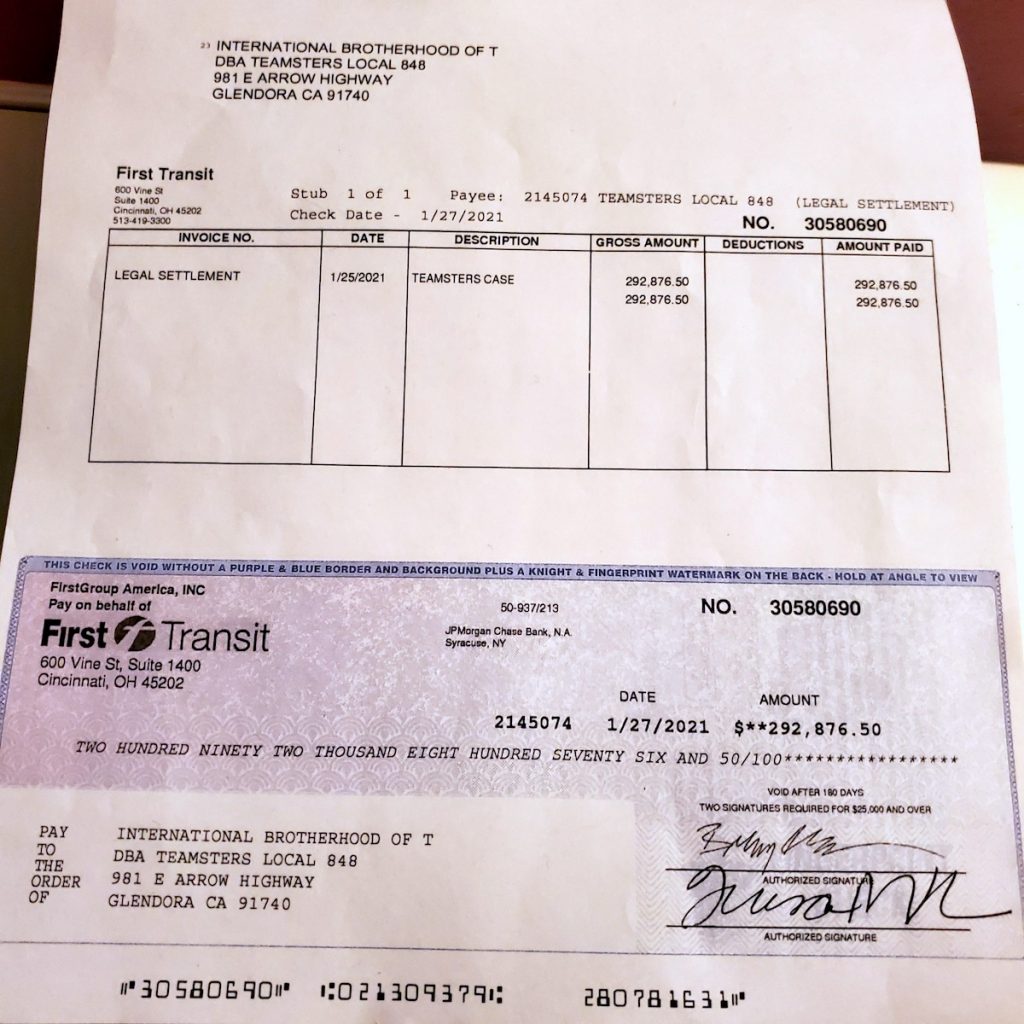Teamsters Local 848 Wins Big Lawsuit and Attorney Fees Award, Requiring California’s Local Government Agencies and Transit Contractors to Obey Worker Retention Laws

In early 2015, the City of Monterey Park issued a request for proposal (“RFP”) seeking bids to operate its Spirit Bus public transportation program. At that time MV Transport employed Teamsters Local 848-represented workers to operate Spirit Bus. California Labor Code Section 1072 required transit bidders to state in their bids whether they would retain incumbent employees for at least 90 days. Only if they did so would the law require those employee-retaining bidders to get a 10 point preference in the bid process. MV Transport made that commitment in its bid, but First Transit did not. Nevertheless, the City awarded an undeserved 10-point preference to First Transit, and awarded that company the bid instead of MV Transport. Local 848 tried to get the City to reconsider through direct communications and public campaigning, but the City refused. Local 848 then sued the City and First Transit in Los Angeles Superior Court, and won an appellate decision that secured the worker protections enacted in Labor Code section 1072.
History of Section 1072 and Local 848
When the California Legislature passed Section 1072, it noted that the employee turnover in local transit contracting system often has resulted in displacing workers who in turn lose paychecks, health insurance and other important benefits. The Legislature declared that Section 1072 serves an important social purpose by rewarding contractors that promise to retain incumbent workers to perform the same work. Because the lowest contract cost often determines which contractor is selected, by creating this preference the Legislature sought to give contractors who commit to workforce stability an advantage in the bid process.
In the case brought by Local 848, Monterey Park granted First Transit the 10 percent preference and ultimately selected First Transit for the contract although First Transit did not disclose whether it would retain the prior contractor’s employees – here Local 848 members. By violating this statute, Monterey Park negated the incentive and preference system enacted by the Legislature.
In Court, Monterey Park and First Transit resisted the Local’s suit and repeatedly argued – despite the clear text of Section 1072—that Local 848 got it wrong. They ludicrously argued that the City had to grant the 10-point preference to companies like MV Transport, that made the incumbent retention commitment, but they could also award the same preference to a company like First Transit that did not make that commitment in its bid. It did not matter, said the City, that giving everyone that preference effectively negated it, and with it, the purpose of the law. Unfortunately, the Superior Court bought that argument. Undeterred, Local 848 appealed.
After four years of litigation, led by Local 848 Attorney Julie Gutman Dickinson at the Bush Gottlieb law firm, in January, 2019 the California Court of Appeal announced for the first time in a published decision, that Section 1072 requires bidders to affirmatively state that they will retain the predecessor contractor employees in order to obtain the 10 percent preference, and that a bidder who remains silent on that issue cannot receive that preference. The Court agreed that Local 848 had the better argument, and remarked that if the Court followed Monterey Park’s interpretation, there would be no incentives for contractors to promise to retain employees – in clear opposition to the California Legislature’s intent in passing Section 1072. After Local 848’s victory, it sought and won the cost of hiring attorneys to require Monterey Park and First Transit to follow the law.
The Long Term Impact of the Case
This case is a significant victory for public contract workers across the state. It sets a precedent that cities and counties across California are bound to follow, to ensure that government contracting bodies adhere to the worker-protective process enacted by the legislature.
By challenging Monterey Park’s decision to disregard the law, Local 848 has shown Monterey Park, First Transit, and employers across the state that Local 848 stands up for what is right and will hold employers accountable. Local 848 won the legal argument, and also won its attorneys’ fees, because the Court determined that the victory served not only Local 848 and its membership, but the public at large; in essence, the Local served as a private attorney general, protecting the peoples’ right to enforce and uphold important employee protections. This case and Local 848’s commitment to standing up for workers sends a message loud and clear that it will not back down, and that employers should think twice before they break the law on Local 848’s watch.

